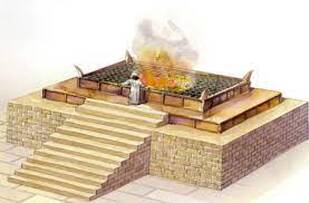
The Hebrew word we translate into English as Ariel is used in several places in the Bible.
In Isaiah 29 we see this prophecy,
“Woe to Ariel, to Ariel, the city where David dwelt!
Add year to year;
Let feasts come around.
Yet I will distress Ariel;
There shall be heaviness and sorrow,
And it shall be to Me as Ariel.
I will encamp against you all around,
I will lay siege against you with a mound,
And I will raise siegeworks against you….”
The NIV translates verse 2 as ‘Yet I will besiege Ariel; she will mourn and lament, she will be to me like an altar hearth’ as do margin readings in some other tranlations.
The Amplified Bible puts it this way, ‘Then I will harass Ariel, And she will be a city of mourning and lamenting (crying out in grief) Yet she will be like an Ariel [an altar hearth] to Me’ ...
and the Jewish Publication Society has it, ‘Then will I distress Ariel, And there shall be mourning and moaning; and she shall be unto Me as a hearth of God.’
Jerusalem has many poetic names in the scriptures and calling the City of David the Altar Hearth is another telling and most appropriate poetic description, for that is indeed where the altar of sacrifice stood, at the temple in the City of David.
In Isaiah 29 God is pointing up the awful irony of the city of the altar herself becoming in her entirety, a fire hearth.
(Note that 'Ariel' is also used in Ezekiel 43:15 & 16 to mean the hearth of the altar).
 RSS Feed
RSS Feed
